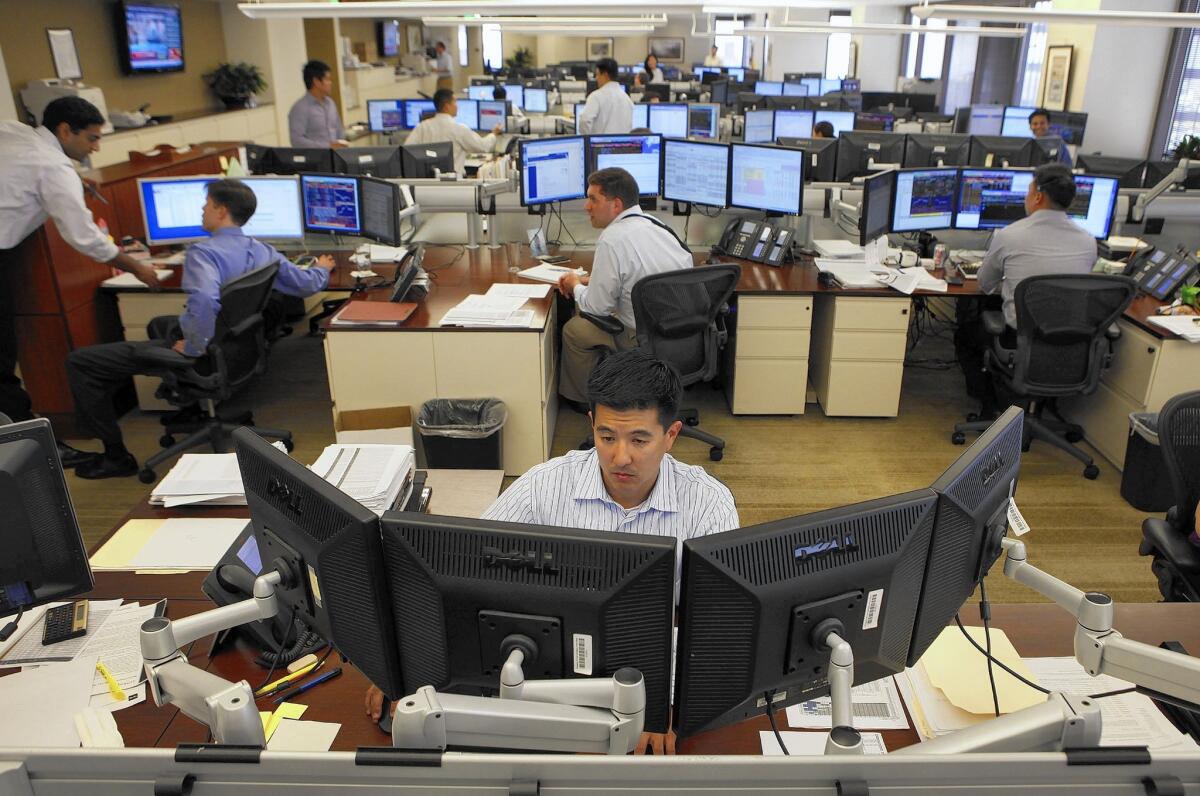Southland bond traders had prepared for scenarios from Greek debt crisis

- Share via
The latest failure to solve the Greek debt crisis — the national vote rejecting a bailout proposal over the weekend — sparked a new round of anxiety among investment managers around the globe Monday morning.
But in Newport Beach, the bond traders at Pacific Investment Management Co. had been game-planning for months, prepping for the various political and financial scenarios that might be triggered by a Greek debt default. That preparation, which included reducing exposure to bonds of Southern European countries, gave traders a certain confidence over the last week, even as the country struggled to stave off a banking collapse and an ouster from the Eurozone.
------------
FOR THE RECORD:
L.A. bond firms: In the July 7 Business section, an article about Southern California bond firms’ reactions to the Greek debt crisis referred to Western Asset Management Co. as the third-largest bond firm in Los Angeles. It is the company’s family of bond mutual funds that rank third in L.A. Also, the article suggested that, in terms of performance during an eight-month period, Pacific Investment Management Co.’s Total Return fund ranked ahead of TCW Inc.’s Metropolitan West Total Return Fund, which ranked ahead of DoubleLine Capital’s Total Return Fund. In fact, DoubleLine was ahead of Pimco, and MetWest was third among the group.
------------
“There’s not going to be a mad scramble,” Scott Mather, one of three portfolio managers overseeing the firm’s huge Total Return Fund, said recently as the Greek government declared a bank holiday. “We’re well-positioned for a number of scenarios.”
Mather wouldn’t divulge Pimco’s positions in Europe but said the company has been dialing back on the riskier debt of weaker countries such as Spain, Portugal and Italy and concentrating on financial bulwarks such as Germany and France.
Similar scenes continue to play out at major financial institutions throughout Southern California, which has built itself over more than 40 years into one of the world’s bond trading capitals. The region is home to early 1970s pioneers such as Pimco co-founder Bill Gross, Robert A. Day and his Trust Co. of the West and Michael Milken, who moved his vaunted junk bond trading operation to Beverly Hills for New York’s infamous Drexel Burnham Lambert investment banking house.
Today, four of the nation’s five largest actively managed bond funds are based in the region.
On Monday, at the TCW Inc. building in downtown Los Angeles, traders on the 16th floor monitored news reports from their four computer monitor desk setups, looking for any scrap of intelligence from Greece or other global markets. Blaise Antin, head of sovereign research, said the “slow-developing train wreck” in Greece had allowed traders and clients to reposition their portfolios to withstand any Greek debt meltdown.
Michael Buchanan, deputy chief investment officer at Western Asset Management Co. in Pasadena, had a similar take.
“We all came in early this morning wondering exactly how the markets were going to respond,” he said of the Greek vote over the weekend, rejecting the latest European bailout offer. “For the most part, the market has held up reasonably well.”
The Greek crisis is only the latest bit of intrigue in the world of L.A. bond houses. The seemingly placid bond market has been anything but that for more than a year, starting with an upheaval at Pimco that led to Gross’ abrupt departure last fall, and continuing this year with plans to handle the effects of a hike in the Federal Reserve’s benchmark interest rate — which could signal an end of the long-running bull market in bonds.
The Greek debt crisis has kept the traders’ blood pumping.
The turmoil at Pimco, starting with the unexpected departure of Mohamed El-Erian as chief executive in January 2014, has been the single-biggest weight on the region’s hold as a bond trading leader.
Gross’ resignation near the end of September appeared to end the internal turmoil, but it triggered the equivalent of a bank run on Pimco’s Total Return Fund, then the world’s largest managed bond mutual fund by far — peaking at $292.8 billion in assets two years ago — and a staple in retirement portfolios worldwide.
In the ensuing eight months, investors pulled more than $106 billion out of Total Return, reducing the fund’s assets to $107.3 billion and rendering it merely one of the world’s biggest managed bond funds.
But much of the money didn’t go far. The trustees of a big Ohio public employees’ pension fund moved its $230 million only 45 miles north to TCW Inc. in Los Angeles.
“The board felt TCW was the best option for us,” said Keith Overly, executive director of the $11-billion Ohio fund.
Collectively, the leaders of the area’s bond houses corralled 42% of Pimco’s outflows, the single biggest chunk of investment money, according to Los Angeles Times calculations based on data from industry research firm Morningstar Inc. in Chicago.
In the scramble to pick up former Pimco funds, the biggest gainer by far has been TCW, the low-key firm run by a trio of former Pimco executives: Tad Rivelle, Laird Landmann and Stephen M. Kane. The successor to Trust Co. of the West gathered more than $32 billion just for its largest fund, Metropolitan West Total Return, from October through May.
With $66.2 billion in assets, MetWest Total Return is the nation’s third-largest actively managed bond fund. In the past year through April, the fund ballooned 127%, even as Pimco’s flagship fund fell by more than half to $107.3 billion.
MetWest Total Return took in more in the post-Gross scramble than the combined flagship funds of East Coast giants Fidelity Investments, JP Morgan Chase & Co. and Goldman Sachs Group Inc., and far outstripped rival BlackRock Inc.’s take in all of its mutual funds, according to Morningstar data.
Michael Rosen, a principal at Angeles Investment Advisors, which advises institutional investors, said MetWest benefited from its size and consistency in attracting cautious bond investors, which often move herd-like to a few firms.
“It’s not only a good choice, it’s a safe choice, and in that sense, it makes it an easy choice,” Rosen said.
The month after Gross left, Pimco resembled “a land grab” as firms from around the country made pitches for investors’ funds, said Owen Murray, a partner at financial planning firm Horizon Advisors in Houston.
He moved his clients’ money — about $13 million — to MetWest, but not because the L.A. firm approached him. “It was sort of the opposite; I reached out to them,” he said. “Their team was completely swamped.”
Besides TCW, Jeffrey Gundlach’s DoubleLine Capital in Los Angeles also was a big winner at the expense of Pimco. Its main fund took in $9.8 billion in the first eight months after Gross bolted for Janus Capital Group Inc. The fund jumped 36% in the year through May.
Some firms looked to capitalize on Pimco’s problems to boost their coffers and their profile.
Western Asset Management Co., L.A.’s third-largest bond firm, took out full-page spreads in Barron’s newspaper and Pensions and Investments, a trade publication. The ads didn’t mention Pimco, but touted the performance of Western’s Core Bond Fund, which happens to compete with Pimco’s Total Return fund.
“It’s a fine line,” said James Hirschmann, Western Asset’s chief executive. “You don’t want to be viewed as an ambulance chaser or a grave dancer. At the same time, there’s an opportunity that’s presented.”
Keeping up performance during a time of market shocks and massive fund flows has been a challenge, but some of the big winners in the post-Gross challenge have managed to do it. Metropolitan West Total Return ranked third and DoubleLine fourth in their category from October through May, according to Morningstar.
But in any case, investors say they don’t base their investment decisions on short-term results. (Pimco’s Total Return, for instance, had the best performance of all three during the period of heavy outflows.)
Wamco’s Hirschmann said rival MetWest, with its leadership of Pimco-alumni and similar investment mix, was successful in part because it’s regarded as being similar to Pimco. Plus, he said, MetWest had the size to handle the influx of cash.
“They were perfectly positioned,” he said. “They could handle the big chunky moves.”
The Southern California bond world is so intertwined mainly because it springs from a few firms.
Gross — who dabbled in professional blackjack before becoming a credit analyst with Pacific Mutual Life Insurance Co. — co-founded Pimco in 1971 on the idea that successful bond investing depended on sophisticated analysis of big-picture macroeconomics and monetary policy.
Milken moved his Drexel bond trading operation in 1978, creating an important power center far from the parent company. He upended the financial world with his view that the debt of out-of-favor public companies was dramatically undervalued.
And Robert A. Day, heir to California’s Superior Oil fortune, started Trust Co. of the West in 1971. In the mid-1980s, the low-profile firm hired Gundlach, a former rock drummer and doctoral candidate in theoretical mathematics with a knack for navigating the booming market in mortgage bonds.
Brash and outspoken, Gundlach would became one of the country’s most successful bond investors, burnishing his record by correctly calling the 2008 financial crisis that wrecked portfolios worldwide.
After a bruising power struggle in 2009, TCW, then owned by French bank Societe Generale, fired Gundlach and simultaneously bought Metropolitan West Asset Management, founded by the former Pimco team, to offset gushing outflows that accompanied the high-profile battle.
Gundlach quickly formed DoubleLine with a cadre of TCW loyalists, moving into the downtown offices of Oaktree Capital Management, which itself was run by former TCW trader Howard Marks.
One reason Los Angeles could thrive as a bond center far from East Coast financial centers is the nature of the business — a cloistered world in which trading is done over telephone calls with big banks, not public exchanges.
Christopher Schwarz, a professor of finance at UC Irvine, said academic research has found that stock investing benefits from proximity to information centers.
“I’m not sure that happens much with bonds,” where success depends more on solitary financial research than word-of-mouth tips, he said.
Times staff writer Samantha Masunaga contributed to this report.
More to Read
Inside the business of entertainment
The Wide Shot brings you news, analysis and insights on everything from streaming wars to production — and what it all means for the future.
You may occasionally receive promotional content from the Los Angeles Times.











